Senior leaders representing more than 30 of the nation’s largest federally qualified health centers (FQHCs) traveled to our nation’s capital to have a conversation about the future of the Community Health Center Program with high-ranking officials during ACH’s 3rd Annual Member Meeting. This year’s meeting, held on March 5-7, 2024, came at a pivotal time for health centers who face continued uncertainty around reliable and long-term funding for the Health Center Program which serves more than 31.5 million patients nationwide.
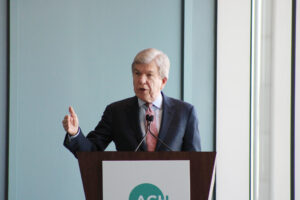
“This is a time for change in public health and community health,” said the event’s opening keynote speaker, former U.S. Senator Roy Blunt (R-MO), a champion for community health centers and renowned health policy leader. “I hope we can find a way to keep community health centers at the forefront of that discussion.” Senator Blunt also spoke about the importance of advocacy, the incredible value of health centers, and his personal choice to make support for health centers his legacy.
The Centers for Medicare & Medicaid Services (CMS) Deputy Administrator and Chief Operating Officer Jonathan Blum participated in a fireside chat with ACH CEO Amanda Pears Kelly about the ways CMS is making it easier for health centers to participate in its programs. “Our near-term goal is to build momentum and gaining trust to better serve patients.” He added, “There is far more demand than we have capacity” and noted the strategies that the agency is using to address that patient demand. He spoke about vital role that health centers play in advancing coverage for those in need, serving as a trusted source for health care and information in their communities.

During her afternoon keynote remarks, Health Services and Resources Administration (HRSA) Administrator Carole Johnson discussed the significant investments HRSA has made on behalf of health centers relating to this administration’s key priorities, in addition to challenges in the current funding environment. “In alignment with the President’s Cancer Moonshot, we were able to identify opportunities to do quality awards and quality recognition for health centers that have made real progress on cancer screenings.” Johnson also spoke of the challenges that HRSA faced in delivering services to health centers with the series of continuing resolutions that have been passed by Congress since September. “We finally have a package now that should get us through the end of this calendar year and we’re going to get that ready as fast as we can…. But we had to sort of start over again on our debate and engagement with Congress on getting our programs renewed and reauthorized, getting multi-year funding and getting back on track with them.”
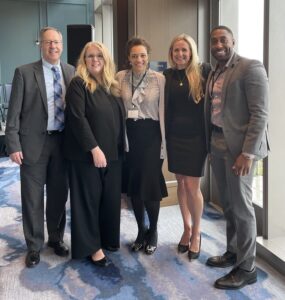
Additional speakers included James Macrae, M.A., M.P.P., who leads HRSA’s Bureau of Primary Health Care; Luis Padilla, M.D., who leads HRSA’s Bureau of Health Workforce and the National Health Service Corps; Center for Medicare and Medicaid Innovation (CMMI) Director Elizabeth Fowler, J.D., Ph.D.; and Ann Greiner, M.C.P., President and CEO of the Primary Care Collaborative.
“One in five households still don’t have broadband access,” said Associate Director of the Federal Office of Rural Health Policy at HRSA Sarah Heppner during the panel discussion on health equity and ensuring equal access to care for underserved communities. As telehealth use saw rapid adoption during the pandemic, Heppner discussed the data that HRSA is looking at to address telehealth access disparities and referenced HRSA’s Telehealth Resource Center. Dr. Aditi Mallick, Acting Director of the CMS Office of Minority Health, added, “We have intentionally made policy changes to allow for reimbursement for telehealth” noting the importance of this policy change for health centers and their patients.
One of the most popular sessions of the week was the Community Health Center Entrepreneur Challenge Panel, where the winners of the challenge shared how they are using the $500,000 grants they received from UnitedHealthCare to implement their programs. “We are all going to age,” said Mari G. Millet, CEO of Morris Heights Health Center, who is one of five winners who spoke about their winning proposals. “And if we are lucky, we will age well.” Morris Heights received a grant to launch a pilot program called Age Well to serve its underserved, aging population. Lowell Community Health Center, Mountain Comprehensive Health Corporation, Columbia Basin Health Association, and Mariposa Community Health Center were additional winners who spoke about their innovative programs which range from investments in new technology to address child behavioral health, AI to improve patient outcomes and population health, and health workforce and health equity – all to better serve their patients.
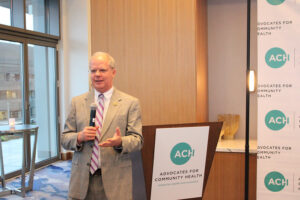
The Chair of the House Committee on Energy and Commerce Health Subcommittee Congressman Brett Guthrie (R-KY) provided remarks during the Wednesday evening member reception and talked about the importance of the Community Health Center program, celebrating the same day passage of increased funding for health centers while also recognizing the need for additional funding given a litany of challenges facing health centers and their patients. ACH’s second annual Advocate of the Year Award was presented during Wednesday’s reception to Government & Community Affairs Director at North East Medical Services Jessica J. Ho for her persistence, passion and commitment to health center advocacy.
ACH’s Annual Member Meeting could not have been better timed, as Congress considered legislation to increase funding for health centers during the week of the meeting. Stephanie Krenrich, ACH’s Senior VP of Policy & Government Affairs, announced during the Wednesday session that the House had passed a continuing resolution to include a 10% increase for health centers through the end of 2024, the first increase in over five years, and something that ACH has been lobbying for since its inception in 2021.
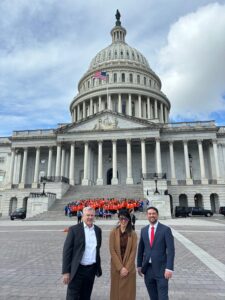
The Annual Member Meeting concluded with health center leaders meeting their legislators on Capitol Hill on Thursday, March 7, to urge Senators to pass the continuing resolution containing a 10% increase for community health centers, invest $9 billion in combined mandatory and discretionary funding for community health centers in Fiscal Year 2025, and support ACH’s 340C proposal to protect the vitally important 340B program. Members also asked their Representatives to cosponsor the Health Center Community Transformation Hub Act, HR 1072, to help address the social drivers that contribute to health outcomes for patients. In addition, at least one ACH member accompanied their Representative to that evening’s State of the Union Address in the U.S. Capitol.
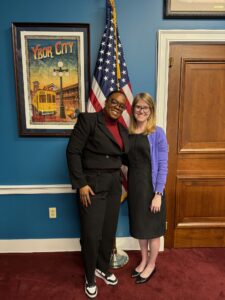
While funding for the Health Center Fund was increased by 10% through the end of 2024, this does not provide for a long-term, meaningful solution for the Health Center Program. “No one tells your story better than you do,” said Senator Blunt to ACH’s members during his keynote address. “Get out there and vigorously tell Congress and staff your story and why this matters.”
Members advocated for the reauthorization of the Community Health Trust Fund at the level passed on a bipartisan basis by the Senate HELP Committee in the Bipartisan Primary Care and Health Workforce Act, S. 2840, $5.8 billion a year for three years. This funding would allow health centers to grow in four key areas including operations, infrastructure, workforce, and innovation.
ACH is grateful to the speakers who shared their passion and knowledge with us, and for our members, for their tireless advocacy and for prioritizing their time to travel to Washington to share, learn and advocate. It is the passion, innovation, leadership and vision of our members that powers ACH, never more evident than during our Annual Member Meeting and in the work and priorities that follow.
Thank you to this year’s 2024 Annual Member meeting sponsors who made this event possible including UnitedHealthCare, Equiscript, Quest Diagnostics, Centene Corporation, Facktor, and SyncTimes.